SASKATCHEWAN
4 women explain what feminism looks like to them in 2023
Wed, March 8, 2023

On March 8, 1979, Iranian women’s celebrations of International Women’s Day turned into protests against a new decree by Khomeini about mandatory veiling. (Hengameh Golestan - image credit)
The meaning of feminism has changed over the years — from fighting for rights to vote and own property, to equality and anti-discrimination, to now a push for more inclusivity beyond white, cisgender women.
On Tuesday, one day before International Women's Day, CBC Saskatchewan's Blue Sky hosted a discussion on feminism in 2023. Guests shared their unique experiences and spoke about what feminism means to them.
"When I had a same sex partner in the late '90s and was in the process of coming out, the personal definitely became political," Nicole White said on the program.
"The fight isn't over yet. There has been an active attack on particular marginalized communities and it's been really disconcerting. We have to constantly be looking around the table and asking ourselves who isn't here and why aren't they here and creating space for them and amplifying those voices whenever possible."
White said her version of feminism is different as it was 20 years ago and hopes it will continue to evolve.

Submitted by Nicole White
White founded Moontime Sisters, an organization that supplies free menstruation products to people in Northern Saskatchewan.
"A menstrual product that I would pay $5 for in Saskatoon could be upwards of $20 in northern Saskatchewan communities, and that is absolutely considered a luxury product for a family," she said, noting access and equity remain as hurdles.
After consultation with two-spirit elders, White said the organization has started the process of changing its name to Moontime Connections.
"To honour two-spirit and trans menstruators in Canada and recognizing that we can still honour the sisterhood and the kinship when it comes to menstruators across the province. We never ever want to turn someone away with the use of language that's not inclusive."
She is now the project leader of Enough Already, an organization that challenges sexual harassment in the workplace, and said the situation with gender-based and sexual violence is still fairly dire.
Responding to a Blue Sky listener's question about ageism, White said more safe spaces should be created for female seniors.
'Equity more than equality'
Yashica Bither says she faced microaggressions throughout elementary school in Regina, and found feminism in high school.
Bither is now women's centre co-ordinator at University of Saskatchewan Student Union. She spoke about intersectional feminism, which looks at how different elements of a person's identity — their race, gender, orientation and others — inform their experience.
"My definition of intersectional feminism is looking at equity more than equality. Feminism is all about equality. That intersectional lens allows all members of the community to benefit from that and not just a particular group," they said.
"We do need an intersectional lens to feminism. White folk are not the only people who should be at the forefront. Especially as Saskatchewan gets more diverse, we need to acknowledge that these voices need to be amplified."
Bither said the centre offers peer support, menstrual products, pregnancy tests, contraceptive products and a listening ear.
"Allyship is important to the movement, especially to the trans folks," Bither said, noting in many such movements, Black trans voices led the fight.
"They deserve safe spaces as much as we do. Trans people are not confused.… They are who they are and they need to be listened to."

Submitted by Yashica Bither
Tasnim Jaisee agreed, saying trans women are women and that everyone needs "to protect our sisters."
Jaisee is a USask undergraduate student in political studies and women's and gender studies, with a research interest in intersectional feminism and critical disability studies.
She said she grew up facing a combination of "sexism, racism and ableism," as she is a woman of colour who uses a wheelchair.
"Pop feminism is the first step of girls empowering girls, women empowering women. It's a feel-good version of feminism. But moving into intersectional feminism is a bit different, because it is essentially becoming more critical of the system of power."
Jaisee said intersectional feminism unpacks how identity has layers, like how women of colour experience racial and gender-based systemic barriers.
"That intersectional layer is very, very critical to understanding some of those unique experiences."

Submitted by Tasnim Jaisee
Jaisee's mother fled Bangladesh to Canada after the outbreak of the Bangladesh Liberation War.
"Her feminism was different from mine. Her feminism was to seek opportunities of education and that again was quite revolutionary."
Disability activism work within intersectional feminism has helped Jaisee feel more included.
"My racial and disability identities have impacted everything I do. Intersectional feminism makes me realize that the systemic barriers I face are not my fault."
She said women mentors — like her professors, supervisors and bosses — have been pillars of support.
'The only way forward is with compassion and empathy and love in our hearts'
Cecilia Rands said growing up with a single father who identified as a feminist helped her immensely with embarking on her own feminist journey.
Rands said she realizes the privilege she has, being a white cisgender woman.
"Having those privileges never means you can't fight for the rights of others. My father always worked to be an ally and that gave me a good push," she said.
Rands's work focuses on education around gender based violence and allyship, and involves working with men and boys to make them realize their role in helping end oppression and violence.
"The only way forward is with compassion and empathy and love in our hearts," she said.
"We can't expect men and boys to take up that mantle if they don't feel that love and compassion and acceptance just as much as we want women and everyone to feel."

Submitted by Cecilia Rand
Rands, who has also worked at a Planned Parenthood, said demystifying abortion is also very important.
"Abortion is health care. It's that simple. Saskatchewan has a really tragic situation of access to reproductive health care," she said.
She said access to medical abortion is not equitable in the province, especially for communities in the northern communities.
She also spoke about violence against women.
"As many strides as we've made as women and feminists, particularly in Saskatchewan, the rates of intimate partner violence and gender based violence are still incredibly staggering and serious. There's still a lot of work to do," Rands said.
"It's hard for me not to worry about my daughter's future in terms of safety."
Canadian group on front line of efforts to ensure Afghan girls, women get an education
Wed, March 8, 2023

Afghan students are shown attending class at an all-girls school in October 2021. Since retaking control of Afghanistan that year, the Taliban regime has increasingly blocked access to schooling for girls and women. (Jared Thomas/CBC - image credit)
After taking attendance and greeting each bright voice chiming in from behind the colourful circles on her screen, the teacher launches into her lesson. She lectures as she scrolls through slides, moving through rainbow-hued maps, photos of mountain ranges and geographical facts about Asia.
It seems like a typical virtual lesson — a format now familiar to most Canadians after the prevalence of online learning during the COVID-19 pandemic — but this Grade 7 geography class is actually a clandestine one: The students are all girls in Afghanistan taking remote classes from their homes thanks to the work of a Canadian non-governmental organization.
Since retaking control of the country in 2021, the Taliban have increasingly blocked access to schooling for girls and women.
A growing list of restrictions spans elementary school through post-secondary, with edicts blocking access beyond Grade 6 and a ban on women in workplaces — including principals and teachers — also disrupting education for girls from Grade 1 onward.
Though some Afghan women and girls fled the country, students who remain are top of mind for many people worldwide, including Canadians supporting their efforts to continue learning.
WATCH | Canadians support secret classes as Taliban halt Afghan girls' schooling:
"It's a risky job and we're very careful about this.... [My students] face danger because they are not allowed," said A., the Afghan instructor teaching the virtual geography class from outside the country. CBC News is not disclosing her full name, nor that of her students, to protect their safety.
"I love my people," the teacher said. "That's why I [joined] this program: to teach them. To do something for them."
The value of education isn't lost on her students, who share that they're still dreaming of careers in such fields as medicine, engineering, computer science and aviation.

Ebrahim Noroozi/The Associated Press
"We are studying for the future, and we hope the situation [in Afghanistan] changes and we would be able to work for this country," said M., one of the Grade 7 students. "If the girls are educated, in the future the society will be educated."
Without schooling for girls, "we won't have any power in the future," said B., her classmate. "We would like to take this risk to be educated and to build Afghanistan, because this country needs us."
Parents make 'sacrifices' for girls' education
Having seen the strides young women have made since the Taliban was last in government 20 years earlier, many Afghans are dedicated to ensuring girls continue learning, said Lauryn Oates, executive director of Canadian Women for Women in Afghanistan (CW4WAfghan), an NGO with chapters in various provinces.
"Families recognize that this is the way out of poverty, that you really need education to make something of yourself in the world," Oates said from Vancouver.
"We're always so amazed at hearing these stories of women, mothers, fathers making sacrifices to get girls in school under the circumstances."
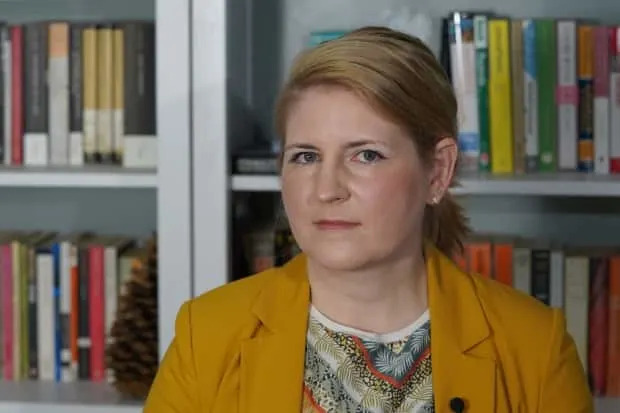
Nicholas Allan/CBC
Over the past 20 years, CW4WAfghan tapped into the internet infrastructure that was rapidly established across Afghanistan, using virtual technology to train Afghan teachers and share a trove of educational resources.
More recently, staff were developing a new sister site of online courses — like the ones offered by many international universities and colleges — for older students seeking to boost their higher education qualifications.
After the fall of Kabul, Afghanistan's capital, to the Taliban in August 2021, the group urgently pivoted to a new effort: continuing girls' learning through online classes. Primary and secondary students now log in for live lessons with educators, complete and submit assignments and write exams online to move onto the next grade. The schedule follows that of a regular school year.
"The longer someone stays out of school, the less likely they are to ever go back to school and gain all the benefits that come from completing one's education," Oates said, adding that the goal "is just to keep everyone learning, no matter the circumstances in the country. And we're reaching both Afghans in Afghanistan, but also displaced Afghans."

Ahmad Sahel Arman/AFP/Getty Images
Over time, more online school offerings and alternative learning initiatives — many started by Afghans in the diaspora — are blossoming in what's becoming a somewhat busy space. Amid the ongoing crisis for female students, Oates said, she's hopeful that there will be more positive developments.
"This may spur innovation in access to education for everyone: for girls and women and the whole Afghan population, for people with disabilities and other challenges," Oates said.
Canadian schools encouraged to ease barriers
CW4WAfghan has also been working to quickly match Afghan post-secondary students with Canadian schools — an avenue given greater impetus since the Taliban extended restrictions to that sector in late 2022, beginning with its ban on women studying at the university level in December.
"We weren't asking universities to [start] new programs or start new scholarships, but to look at their existing resources and ask, 'What can we do in response to this crisis?'" Oates said.
"We might not see the change that we want to see in Afghanistan ... in our lifetimes, but the work that we're doing now will make a big difference in the future. It's like planting a seed for a tree to grow."
Carolyn Watters, a professor emeritus and a former provost at Dalhousie University in Halifax, was among the Canadian academics moved to act. Over the past few months, the retired computer science professor, now based in Victoria, has helped develop a toolkit for Canadian institutions to support Afghan women pursuing or continuing post-secondary studies.
Her suggestions range from adapting current programs to thinking differently about existing offerings. A school may already have a policy accepting students transferring under unusual or extreme circumstances, for instance, or scholarships for international students in need.
They may already be streaming online courses to students located abroad. These measures could include Afghan women as well — if the students know about it, Watters said.

Arshad Butt/The Associated Press
Watters also encourages easing barriers for Afghan women now applying to Canadian institutions, whether it be through waived application fees, creating bursaries for living expenses (which further support beyond academic scholarships), improved access to English-language classes if needed and a fresh look at transferring course credits or partial degrees from Afghanistan to the Canadian context.
"If the universities and colleges have capacity and [Afghan] women have needs, how do you make that connection? We need to make these things align a lot better," Watters said.
Spreading the word of these opportunities through partnerships — such as with NGOs like CW4WAfghan — is essential to ensure efficient uptake, she said.
"We need to kind of step up because two years from now, we will have lost a huge generation of people who want to learn."
'Life means nothing without freedom'
Grade 12 student Razia Arifi, a member of the Hazara ethnic and religious minority in Afghanistan, fled the country with her cousins in 2021. Adjusting to a new language and life in Toronto was difficult after the trauma of leaving behind her parents and a sibling, she said.
Still, Arifi said she knows her parents had her future and well-being in mind. The active teen has always been happiest going to the gym ("which was forbidden and taboo for girls" in Afghanistan, she said), talking about sports or cycling outside.
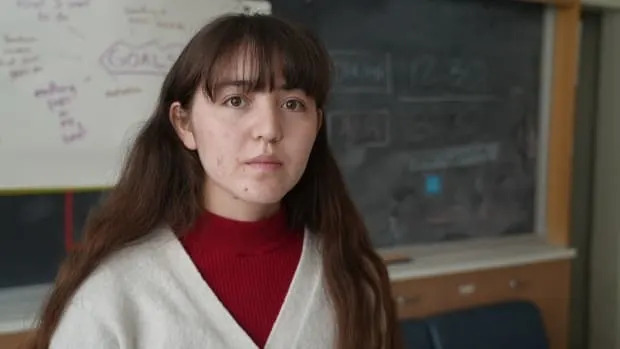
Paul Smith/CBC
"They prefer that if I go somewhere ... it's better to be somewhere else [where] I can be happy and still I can continue my education," the 18-year-old said, adding that physics and astronomy are her favourite subjects at school.
"Life means nothing without freedom," Arifi said. "When I'm thinking about [Afghan girls back at home], I think that now that I'm here and I have a big chance, I should try to work hard. I should try to do something, so that one day if I go back, I might be able to help some of them."
P.E.I. horse owners worried about lack of veterinarians
Wed, March 8, 2023

Christine Lecky says she's worried about what would happen if her horse Darling Jane needs medical care. (Tony Davis/CBC - image credit)
Christina Lecky is worried about something happening to her horses. The owner and operator of Bracken Hill Stable in Baltic says she doesn't have a veterinarian if her horses need one.
"If there's an accident or there's a reason to need a vet for emergency purposes, there's no one I can call," Lecky said. "So it's pretty precarious right now."
Lecky's stable houses seven horses right now, and while she started breeding in 2019, she won't have any foals this year.
"Last year I had a foal that needed to have a plasma transfusion and I had a mare that needed emergency care and both wouldn't be here if I didn't have emergency services," she said. "So I'm in that position where I'm nervous about expanding my business."
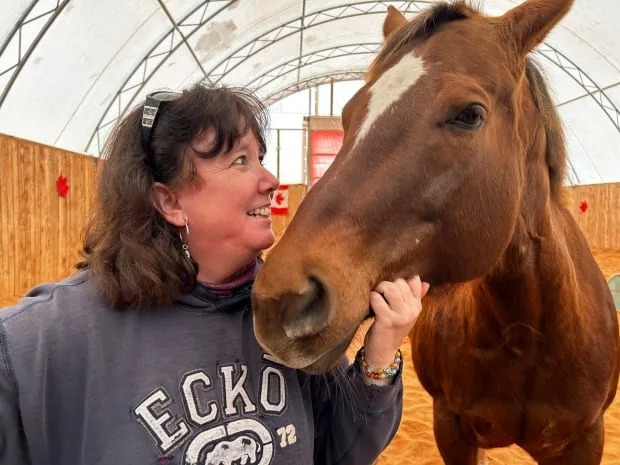
Tony Davis/CBC
'Very few horse vets on P.E.I.'
Lecky has joined a group called Concerned Equine Owners of P.E.I.
It was started by Julia Smith of Briarrose Stables in Indian River when Kensington Veterinary Clinic stopped treating horses.
"There's very few horse vets on P.E.I.," said Smith.
"We can't get any medications. If our animals get injured or hurt, we can't have them humanely euthanized.... It's terrifying. Absolutely terrifying."
Smith said the group has more than 125 members and that at least 800 Island horses are affected by the lack of veterinarians.

Tony Davis/CBC
The Atlantic Veterinary College in Charlottetown provides referral and emergency care in hospital for horses.
It also has an ambulatory service that does farm calls, though the college said in an email that it's currently at capacity "due to a veterinary shortage within the service," and that it's unable to take on more clientele at the time.
P.E.I's Emergency Animal Response Team has approached the AVC and offered to transport horses from farms to the college, a representative of the group said through email.
However, it's hard for people to bring their sick or injured horses to the college to be treated, Smith said.
"Maybe they broke a leg, or they're in the middle of having a foal and there's complications, or they're having a really bad colic episode and they're thrashing around," Smith said.
"Not only is it a danger to the horse, the trailer, the truck driver, the general public, because they're going to be bouncing that trailer all over the road. It's just not safe."
'Knowledge is our best bet now'
Alison Lecky, also at Bracken Hill Stable, said she's considering taking an equine first aid course so she can help her horse in an emergency.
"I imagine that's gonna be something that I will take in the near future. There's a few different people offering it on P.E.I., that would be where I would start," she said. "Knowledge is our best bet now."
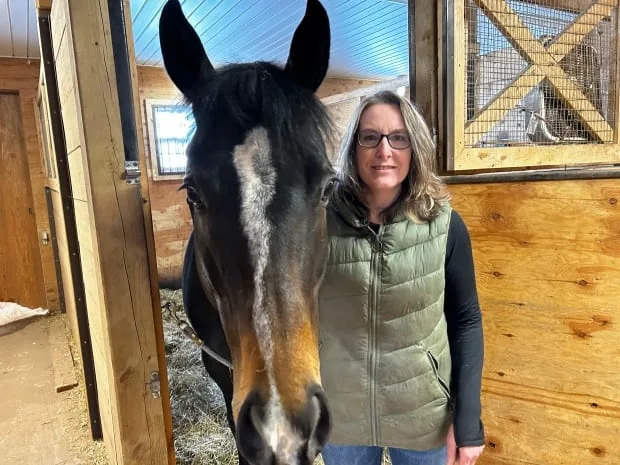
Tony Davis/CBC
Christine Lecky says she's spoken with other veterinary clinics about caring for her horses, but they don't have any availability.
"It's the whole industry; they're spread thin," she said.
She and Smith both said they hope more veterinarians want to treat horses on P.E.I. in the future, and they're surprised at the difficulty finding care considering the harness racing industry's prevalence and the local veterinary college.
"We need to be promoting the equine industry and getting more vets out here in P.E.I." said Smith.
Maine has a surplus of human waste. It's being shipped to New Brunswick
Wed, March 8, 2023
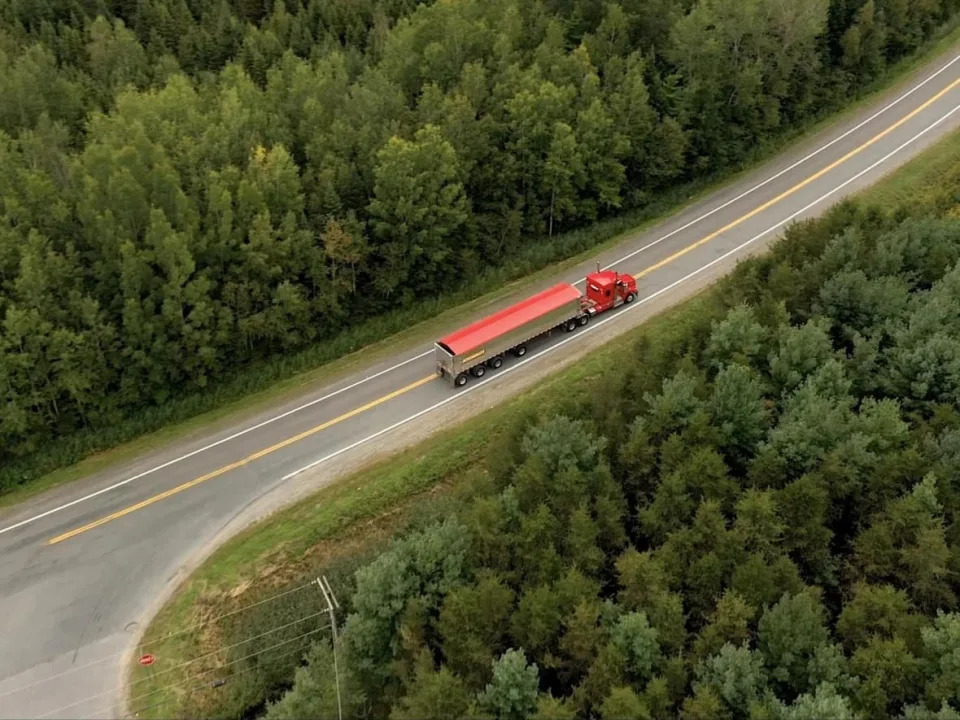
Casella Waste Systems was shipping sludge to Québec for agricultural use but after Radio-Canada reported on those shipments last December that province imposed a moratorium. (Francois Genest/Radio Canada - image credit)
A Maine company with a surplus of human waste is increasing its shipments to New Brunswick.
Casella Waste Systems confirmed that it's shipping more sludge from its large landfill north of Bangor across the border and into this province.
"We have recently entered into a new contract with a disposal outlet in New Brunswick," Jeff Weld, the director of communications for Casella, told Radio-Canada in an email.
The New Brunswick government appeared unaware of the increased shipments when contacted for comment.
Environment Department spokesperson Anne Mooers said Fredericton-based Envirem Organics is the only company in the province licensed to import biosolids and has been doing so "for a number of years."
She said the company imported 13,400 tonnes from Maine and Nova Scotia in 2022. "This isn't new," Mooers said in an initial response.

Francois Genest/Radio-Canada
But Casella is moving far more than that amount, according to a company letter.
It's shipping 3,600 tonnes of Maine sludge — about 130 truckloads, according to one Maine media report — to New Brunswick each month.
In a second response, Mooers said Envirem has a "cap" of 100,000 tonnes annually so it "can handle" the additional shipments from Maine.
"The government of New Brunswick takes its role to protect the environment extremely seriously," she said.
"We have had strict regulatory requirements for importing biosolids for many years. New Brunswick legislation requires all importation of waste products to be approved by the province."
'Short term' increase, company says
Envirem CEO Bob Kiely said in a text message that the company has had contracts with Casella for years and "the increase in volume … is expected to be short term."
He said the company has developed more stringent standards for what it accepts "than any other regulatory jurisdiction."
Casella is facing a serious capacity crunch as a result of two new state laws.
A law which took effect Feb. 8 bans the use of the sludge for agricultural production in Maine.
It's a response to concerns the sludge contains so-called "forever chemicals" known as PFAS that are considered a risk to human health.
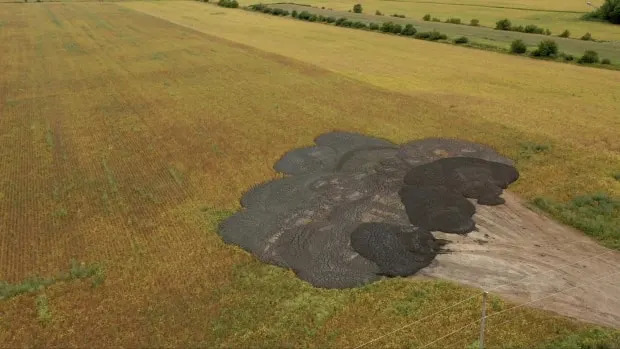
Francois Genest/Radio-Canada
Another problem is a recent state ban on importing large bulky waste that Casella could mix with the sludge to bury it.
The two bans leave Casella with too much sludge to handle at its landfill site in Old Town, north of Bangor. The site receives sludge from about three dozen local sewer plants.
Casella was shipping sludge to Québec for agricultural use but after Radio-Canada reported on those shipments last December that province imposed a moratorium, based on the same concerns about PFAS.
The U.S. Environmental Protection Agency says exposure to certain levels of PFAS, or perfluoroalkyl and polyfluoroalkyl substances, have been linked by peer-reviewed studies to some cancers, decreased fertility, low birth weights and other effects.
PFAS are chemicals used to make coatings that resist heat, oil and water and can be found in adhesives, packaging and non-stick cooking surfaces among other places. They do not break down and can accumulate.
Weld said in his email that the Québec moratorium "does not have anything to do with" the shipments to New Brunswick.
"All operations are in full compliance with regulations," he said.
Kiely said he expects Casella to find other sources of large bulky waste to mix with the sludge, which will allow it to be buried and reduce the surplus at the landfill, returning export levels to normal.
Concern from N.B. agricultural group
Joel Lamarche, president of the Agricultural Alliance of New Brunswick, said he was concerned about the shipments and would discuss them with the organization's board.
In the meantime, he is warning farmers in the province to not accept any biosolid-based fertilizers that might be from Maine.
"What I would tell them is to refuse it. It's better to refuse it and have no problems than accept it and risk having a major problem," he said.
"If you don't know what's in it, don't use it."
Kiely said Envirem makes compost and its product isn't used on agricultural land. He said he's not aware of any sludge applied to farm crops in the province by Envirem or anyone else.
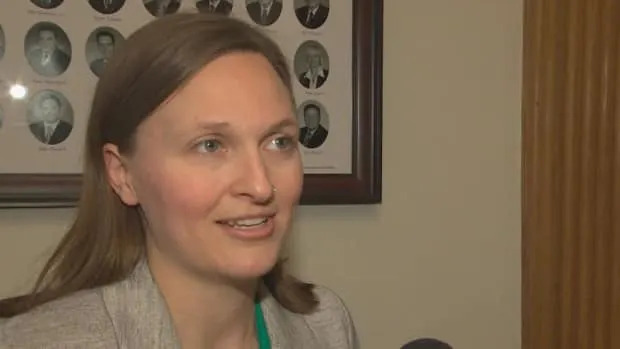
CBC News file photo
He also said the company is "very selective" about what it receives and recently added even more stringent standards to address "new and emergent concerns."
That includes allowing only "very low" levels of PFAS, he said.
Green Party MLA Megan Mitton says the province needs to act on the Maine shipments.
"They're sending them to New Brunswick because they don't want to deal with the consequences of those products," she said. "I don't want New Brunswick to have to deal with those consequences either."
Sabaa Khan, the David Suzuki Foundation's director-general for Québec and Atlantic Canada, says New Brunswick needs stricter rules on PFAS.
"Under New Brunswick's guidelines, PFAS levels in biosolids are not integrated into the quality criteria. Québec is now looking at that situation and New Brunswick has to take the same action."
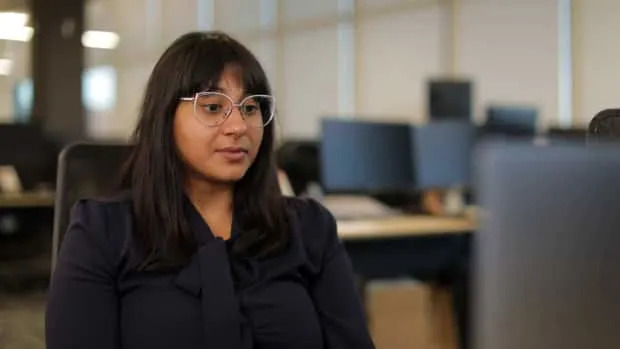
Francois Genest/Radio-Canada
New Brunswick's environmental guidelines for the use of industrial byproducts in agricultural soil bans the use of "materials derived from municipal biosolids, which have high levels of pathogens," but does not mention PFAS.
Mooer's response from the environment department Tuesday did not address PFAS either.
In a Feb. 24 letter to a municipal sanitary authority in Maine, obtained by Radio-Canada and CBC News, Casella said the new state legislation had "greatly diminished" the volume of biosolids that its landfill could handle.
That would require 4,000 U.S. tons —the equivalent of 3,600 metric tonnes — to be sent "out of Maine," leading to higher fees to municipal sewage operations, the letter said.
Khan says in Canada, the Canadian Food Inspection Agency regulates the use of biosolids on agricultural land growing food for human consumption, but its criteria do not cover PFAS.
Provinces have the jurisdiction to regulate biosolids through environmental guidelines, she adds.
"It's incumbent on every province to ensure its biosolid regulations are up to date."
Chinese Canadians walk tightrope in political arena amid foreign interference debate
Wed, March 8, 2023

Mark Lee, a professional translator and former council candidate in Richmond, B.C., says he knows what it's like to walk the fine line faced by fellow Chinese Canadians entering the political arena amid scrutiny of alleged foreign interference.
He says he's not ignorant of the risks and considers potential political interference a serious issue that needs to be addressed.
"I've seen things that I think are maybe suspicious, or I feel like I don't agree with coming out of, for example, the (Chinese) consulate," said Lee, who ran unsuccessfully last year as part of the slate for the Richmond Citizens Association.
But he also worries about Chinese Canadians being tarred by association, and the potential for misunderstanding of "cultural dynamics" during a debate about political interference that has been going on for years within Chinese communities but has recently triggered broader scrutiny and calls for a public investigation.
“There were some people in Richmond who were basically treating it like, if you have any connection with certain groups, then you must be a Chinese government spy or infiltrated or something like that,” said Lee, who lives in the most ethnically Chinese city in Canada.
Lee's concerns are echoed by Chinese Canadian figures across the political spectrum who simultaneously worry, with varying emphasis, about interference by Chinese authorities, a lack of nuance, racism and the use of the debate to push wedges into ethnic Chinese communities.
The Globe and Mail newspaper reported last month that China had worked to help ensure a Liberal minority victory in the 2021 federal election, as well as defeat Conservative politicians considered unfriendly to Beijing, including Kenny Chiu, who lost his seat in Steveston-Richmond East.
Chiu says he's gravely concerned that possible foreign interference may have played a role in his election loss, but also worries about oversimplification, and a monolithic view that Canadians with Chinese links are more likely to be influenced.
Doing so, he said, would play into the hands of foreign governments looking to shape the outcomes of Canadian elections while also putting Canada's multicultural society at risk.
The key, Chiu said, is to fight racism regardless of the victims' ethnicity or cultural background, reducing the chance of it being used to turn Canadians against each another.
"They know that this is a wedge that they can drive into Canadian society," Chiu said of potential Chinese meddling and accusations of racism.
He added that there was a lack of nuance in the debate and was "alarmed" by some of the comments he heard from people generalizing about ethnic origins that, for example, if you were from Taiwan, you must be pro-democracy and for freedom and justice, which isn't necessarily true.
Conservative Leader Pierre Poilievre and NDP Leader Jagmeet Singh have called for a full public inquiry into foreign meddling in Canadian elections, something that Prime Minister Justin Trudeau has resisted.
Poilievre said on March 1 that Chinese Canadian community members are "wonderful" and victims of foreign interference, and any inquiry should include ways to protect people from Beijing.
"Chinese Canadians are patriotic. They are faithful to our country. They deserve our protection," said Poilievre, calling it "absolutely unacceptable" that they should be harassed or intimidated by foreign powers.
Kenneth Tung, a former chair of Vancouver-based immigrant services group SUCCESS, hosts a news talk show on Chinese language radio AM1470.
Tung said that attributing any scrutiny of Chinese Canadian politicians to racism would be a mistake.
Canadians with ethnic, cultural, linguistic or other links to China shouldn't run into problems if their actions reflect Canadian values as a priority, he said.
"I think it's important to make it clear: As a Canadian Hong Konger or Canadian Chinese, we don't need to defend an issue, especially issues that will confuse (observers) if we are defending the Beijing regime," Tung said.
He added "if it's an issue related to the Beijing regime, if it's not our Canadian value, we should condemn it."
In 2016, then Vancouver city councillor Kerry Jang faced criticism when he and dignitaries including then Chinese consul-general Liu Fei wore red neckerchiefs as the Chinese flag was raised at City Hall to mark Chinese National Day.
Critics said the knotted scarves were a Communist symbol, while event organizer Ma Zaixin said a provider had "misunderstood" what type of scarves were required, according to documents released under a freedom of information request.
Jang, a third-generation Chinese Canadian, said he “vividly remembered getting hate mails, death threats. I never was once influenced or told to do something," he said.
As a former politician, Jang said he had met diplomats from many countries, including China. That didn't automatically make him a spy from China, he said.
He said insinuation is no substitute for evidence. “If there is proof that you should charge somebody, you should put them in jail for interfering in our elections," Jang said. "Or if it was a diplomat from whatever country, send them home. Have them expelled."
Lee says the debate isn't deterring him from the political scene, and he plans to run again at the next municipal election.
He sees Chinese Canadians' participation in politics important in the context of the foreign interference debate, because their interactions with Chinese authorities have given them "a pretty realistic understanding of the way they operate."
Lee sees a role for Chinese Canadians that transcends them being seen as victims or perpetrators of foreign interference. Instead, he wants them to play a bigger role interpreting the hazards.
Chinese Canadians like him, he says, "maybe have a little bit more cultural knowledge or a little bit more understanding of the way (this) type of interference can look."
This report by The Canadian Press was first published March 8, 2023.
This story was produced with the financial assistance of the Meta and Canadian Press News Fellowship.
Chuck Chiang and Nono Shen, The Canadian Press
'If we lose this fight, we lose everything': Naskapi, Innu nations oppose Quebec mining project
Wed, March 8, 2023
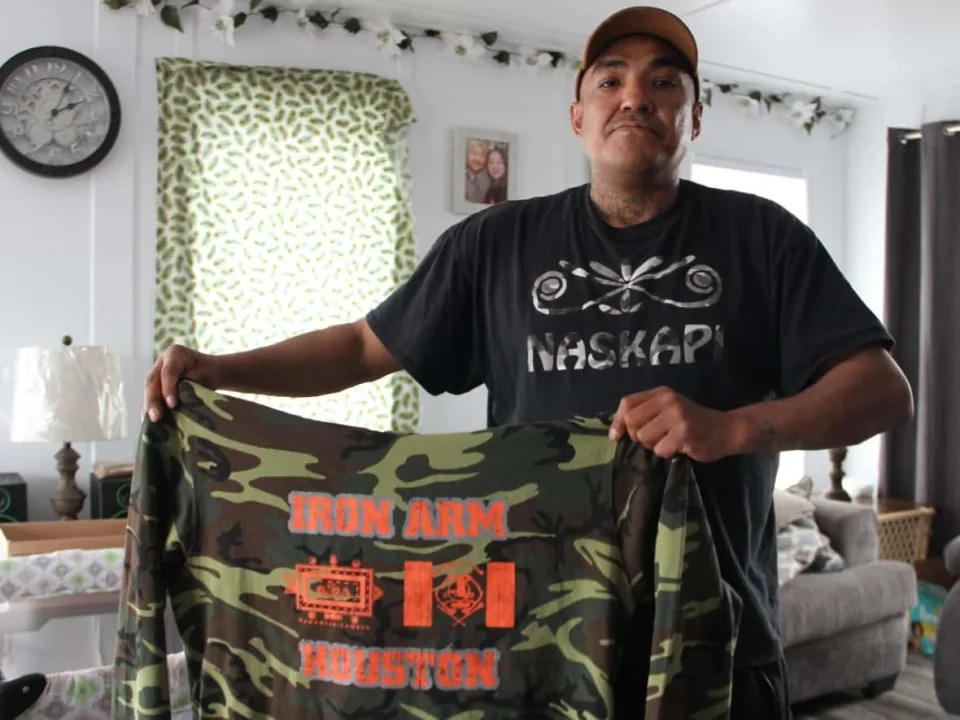
Napess Vollant, who lives in the Naskapi Nation of Kawawachikamach, says he is ready to do whatever it takes to stop Century Global's mining project. (Delphine Jung/Radio-Canada - image credit)
A mining company wants to set up a large operation in Labrador, producing 2.5 million tonnes of iron annually and building a transportation corridor to help get the material from northern Quebec to Sept-Îles.
Century Global says its venture, which has been in the works for several years, would bring in tens of millions of dollars and create hundreds of jobs.
Napess Vollant wants no part of it.
Vollant, who is a member of the Naskapi Nation of Kawawachikamach — located about 1,100 kilometres from Montreal —says the project would ruin Lake Joyce and its surrounding area.
It's a traditional hunting and fishing ground. Vollant says he won't let anything happen to it.
"I am ready to get arrested for it and a lot of my friends are as well," said Vollant.
He's printed T-shirts and created a social media group to spread the word about the project and make sure it never gets approved.
"If we lose this fight, we lost everything," said Vollant.
"This area is what's left for us to find peace. It's our garden… I often think about our elders who lived there."
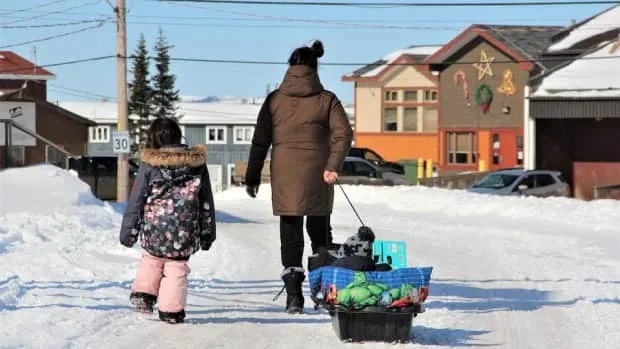
Delphine Jung/Radio-Canada
'They're wasting their time'
Shane Vollant, who is both Innu and Naskapi, is one of many people who own a small cabin near Lake Joyce.
"I spent most of my youth in that cabin. We've been hunting Canada geese every spring there for generations," he said. "The mine would be right in front of our cabin."
A potentially obstructed view of the lake isn't his biggest concern, however.
He's also worried a new mine could affect the water quality in the region.
"I don't want a mine even if we're promised work. We are the only Naskapis in the world and we only have one territory, we can't let it go," he said.
Theresa Chemaganish, the grand chief of the Naskapi Nation of Kawawachikamach, says she shares some of the concerns from her community.
"Since the beginning, we have said that the population's opinion was important. And it's because of this opposition that the council wants to be very transparent," she said.

Facebook/Shane Vollant
Réal Mckenzie, the chief of Matimekush-Lac John, which is about 10 kilometres away from Kawawachikamach, says Century Global might as well drop the project.
He won't budge on the issue.
"There's not going to be a mine there, is that clear? That lake is sacred!" he told Radio-Canada.
"They should stop giving permits to mining companies, it's pointless… They're wasting their time because for us, it will be a no."
The council for the Naskapi Nation appears to be keeping more of an open mind. It says it wants to study the project's potential effects on its territory and traditions.
By law, the communities must hold public consultations.
"We respect the position of the Innu and they respect ours. We just have a different approach. We will follow the process," Chemaganish said.
After meeting with Century Global last november, the Naskapi Nation met with about 60 of its residents.
Century Global told Radio-Canada it wants to continue consulting with different Indigenous communities to "identify their concerns and come up with mitigation measures."
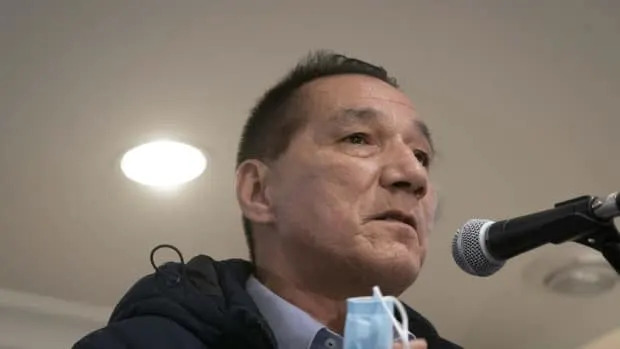
Ivanoh Demers/Radio-Canada
Environmental impact
According to Century Global, the project — if approved — would last about 10 years, including two years of construction and seven years of production.
On the federal government's website, the only external opinion about the project comes from a group of students from the University of Waterloo.
The students wrote that the project should be categorically refused because of "its biophysical consequences and socio-economic impacts."
Century Global has questioned the students' methodology.
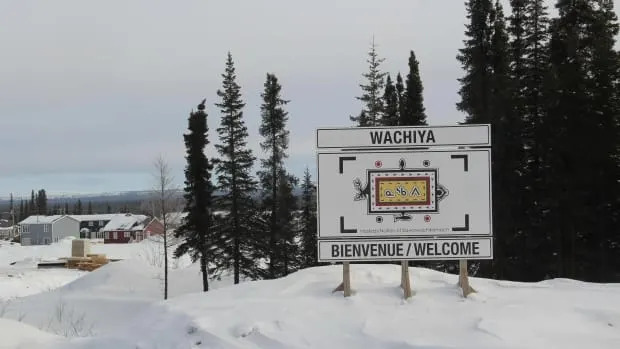
Delphine Jung/Radio-Canada
Émile Cloutier-Brassard, a mining analyst with the Montreal-based non-profit organization Eau Secours, agrees. He says the study had some shortcomings in terms of accuracy and scientific method.
But he does support the students' position that the mining operation would drain the lake, which would affect the environment.
Century Global says draining the lake "is necessary to ensure the safety of workers in the open pit mine."
The mining company promises to refill the lake during the last two years of production.
Allan Gan, who is managing the project for Century Global, says this process will make Lake Joyce deeper, larger and a healthier living environment for fish.
"I have my doubts about the fact that a mining company can bring improvements to a territory or its environment," Cloutier-Brassard said. "That seems counterintuitive to me."
Debate about this project is unlikely to end anytime soon.
Last July, the Impact Assessment Agency of Canada gave Century Global a three-year extension to provide the studies needed for the project to be formally reviewed and, possibly, approved.
NB
Atlantic puffin returns to open water after 'miracle' rescue
Wed, March 8, 2023
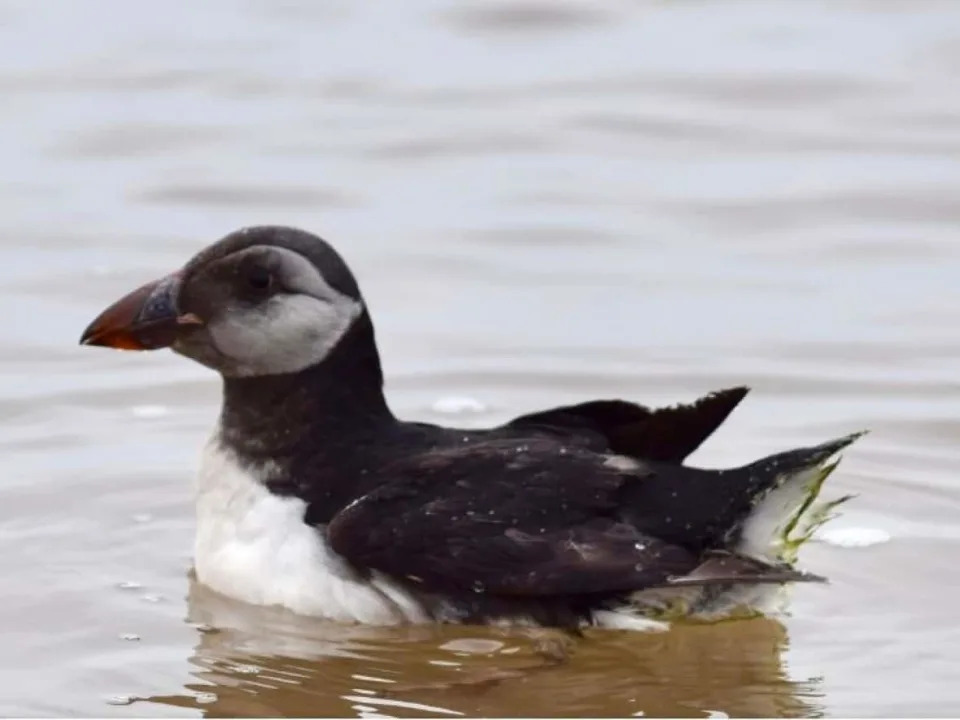
This young Atlantic puffin was released into the water off the New Brunswick coast just days after it was found in the middle of a busy road in Riverview. (Atlantic Wildlife Institute/Facebook - image credit)
The tiny Atlantic puffin rescued from a busy four-lane road in southeastern New Brunswick last Thursday has already been released into open water after a short recovery at the Atlantic Wildlife Institute.
Pam Novak of the Atlantic Wildlife Institute said that when the email came in about a tiny bird in Riverview that had clearly lost its way, she thought it was a typo, and the sender meant pigeon — not puffin.
"Luckily, it was found as quickly as it was," she said. "For the gentleman who found him to find him so quickly before it actually got hit by a car is what the miracle of this is — that that bird didn't get injured."
Weighing in at just 400 grams, Novak and her team did some research and concluded the Atlantic puffin was likely a juvenile, going into its second year. It's plumage is dull, and the bill itself didn't have the iconic orange and yellow colours yet.
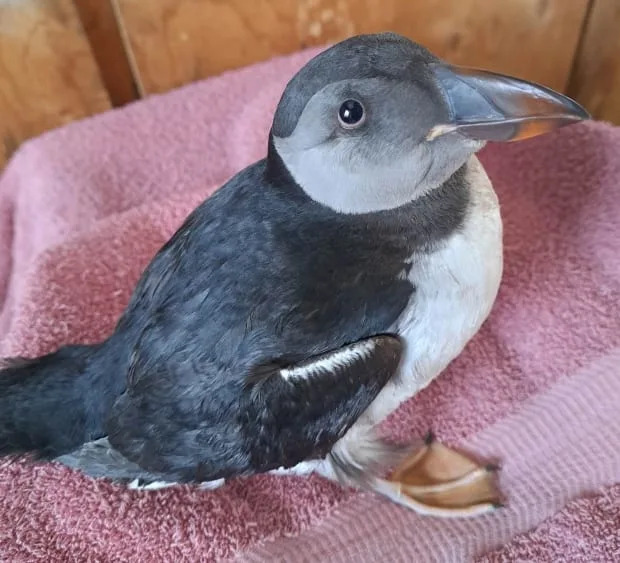
Submitted by Pam Novak
After an exam, a few days of rest, and a bathtub swimming test, Novak knew the puffin was ready to be released into open water.
"We have a little pool set up to make sure that we can see that activity happening and he passed that test," she said. "Then it was a matter of getting him back out."
When it came time for the release, the bird "was very happy to go," she said as she laughed. "No looking back."
The wildlife care team determined the bird was most likely on its way to Grand Manan or nearby Machias Seal Island, and drove the Atlantic puffin down the Bay of Fundy coast to find open water and a direct route to the breeding grounds.
"The consensus was that it's probably trying to get down to Machias Seal Island, so that's where we put it … and shortened his or her trek to get right to the island."
LISTEN | Pam Novak tells Information Morning Moncton about how a rescued puffin has been returned to the wild:
Novak suspects the lonely puffin may had become disoriented by fog that moved in that morning. It was also a "pretty breezy, snowy kind of day."
While there is no way to know whether the bird will survive, Novak is hopeful.
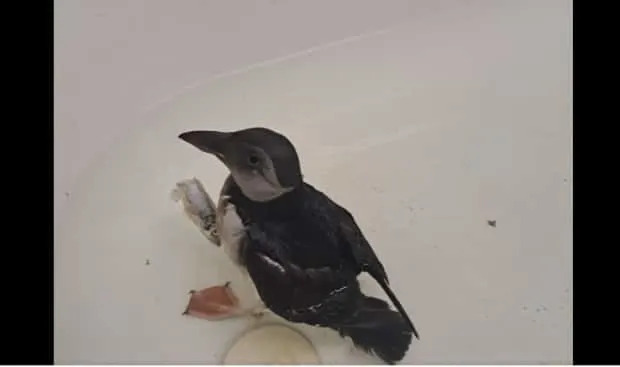
Atlantic Wildlife Institute/Facebook
"A lot of times you're not going to know what's going to happen. All we can do is put a bird out that we felt was in good healthy condition, didn't show any kind of ailments, just got itself put off track for whatever reason and just give them that second chance."
The last time Novak saw the bird, it was in deep open water — a quiet place she describes as the best spot it could be.
"Last we saw it was diving underwater and it took off and that was that," she said. "So that's all we can ask for."
BAY OF FUNDY
Walton marina to assist BigMoon Power's tidal energy project in Minas Basin
Wed, March 8, 2023

BigMoon Power will soon be deploying this tidal power device named the Falcon in the Minas Basin in the Bay of Fundy. The company calls the floating water wheel the Kinetic Keel. (BigMoon Power/Instagram - image credit)
Many have tried and many have failed, but now BigMoon Power is getting close to launching its attempt to harness the power of the world's highest tides and a new marina development in Hants County will be playing a key role.
BigMoon will soon be filling its anchors — modified rail cars — with cement in Walton, N.S. They will then be transported across the Minas Basin to tidal power site near Parrsboro.
"We are starting to move closer toward the implementation of a tidal device in the Minas Passage," said Jamie MacNeil, BigMoon's executive vice-president. "The first phase that we will be embarking on are the gravity bases that will hold our device in place."
Unlike other failed tidal power projects that put turbines on the ocean floor, BigMoon's power generator floats on the surface of the water and a kinetic wheel spins with the current.
Unsuccessful projects launched in Nova Scotia since 1985 have ended in fish kills or equipment failures, among other problems.

Paul Palmeter/CBC
BigMoon's main equipment is called the Falcon and is currently sitting in Saint John, N.B. It will be transported over the next few weeks and attached to the anchor base.
The bases could be moved from Walton between March 21 and 24 when the tides are at their highest this month. But permits are still needed to do the required work below the high tide mark in Walton.
"We want to get this moving as quick as possible so we can move on to the next phase where we can start providing green energy to the people of Nova Scotia from the Bay of Fundy," said MacNeil.
BigMoon Power has done extensive testing of their product in Scots Bay, located in Kings County on the other side of the Minas Passage from Parrsboro.
The company has had a lengthy relationship with marine conservationist Darren Porter, who lives in Hants County. Porter purchased an unused parcel of land next to the harbour in Walton last month. It didn't take long for him and BigMoon to agree to use the site to their advantage.
"The first thing was purchasing it and then secondly was putting money into it for infrastructure to get access down to the water so we put in a roadway," said Porter.
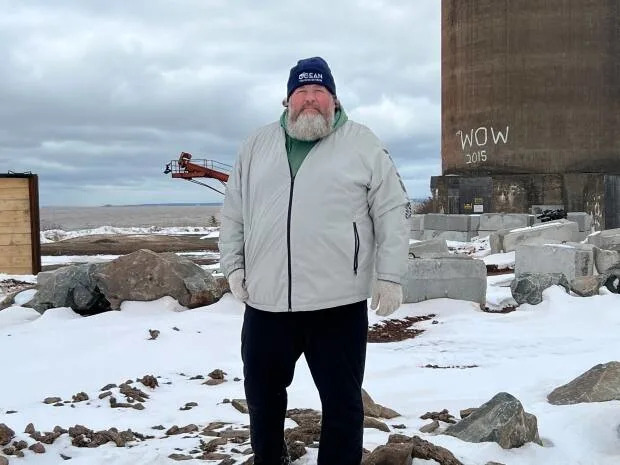
Paul Palmeter/CBC
While BigMoon will have an active stake in Porter's new location, Porter has many other potential ideas for development.
Two weeks ago Fisheries and Oceans Canada (DFO) announced weir fishing can resume in the area and Porter plans to set up his fishing weir next to the property.
A working waterfront
"The possibilities here are endless and we want to rebuild the wharf, of course," said Porter.
The old wharf in Walton was destroyed by fire in 2012 and two Hants County men were charged with arson.
Walton was a busy port decades ago with a nearby barite mine loading ships from Porter's new property during its operations from 1941 to 1978.
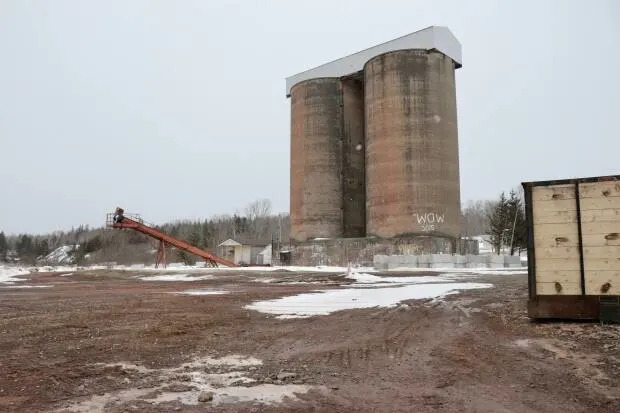
Paul Palmeter/CBC
Two 60-meter-high silos still stand side by side at the site and continue to hold barite. A structure sits on top of the silos that has a commanding view of the Minas Basin and Cape Blomidon, one of the most notable landmarks in Nova Scotia.
"At first my plan was to take them down but I'm finding out most of the locals here are quite attached to them," said Porter.
Porter still has lots of discussions he needs to have with the Nova Scotia government and the Municipality of East Hants to get permits and deal with zoning issues.
Porter says local fire departments can use the new service road already in place to launch rescue boats. He is hoping to see his property become a spot for people to enjoy striped bass fishing, a popular pastime in the area.
Porter says nothing is off the table and he is open to listening to anyone who may have a plan for the working waterfront he envisions.
Salvage operation
As part of BigMoon's a marine renewable-electricity licence, is must lift one of the earlier turbines that failed so miserably. A 1,300-tonne machine has been stranded in the Minas Passage since 2018 when a parent company of Cape Sharp Tidal Venture, OpenHydro Group Ltd., filed for liquidation.
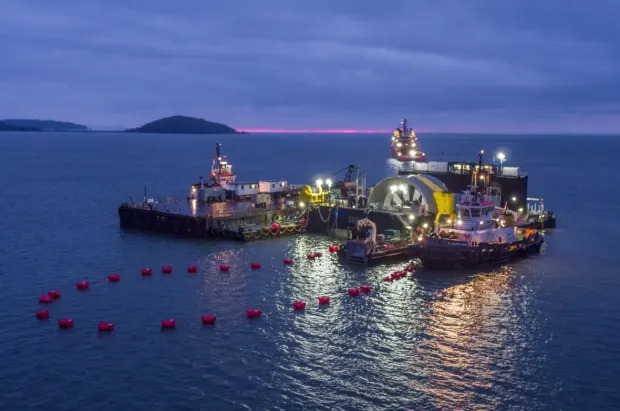
Cape Sharp Tidal
BigMoon has to have it moved by the end of 2024 but they plan to move it to Walton this spring or summer, where it would be dismantled.
"We would like, and I think everyone in Nova Scotia would like, for us to remove that turbine much sooner rather than later," said MacNeil.
The race to become the first company to successfully build a machine that can harness the Bay of Fundy's powerful tides, an endless natural resource, has been very competitive.
While BigMoon Power is ready to take the next plunge, no one is claiming any victories just yet. They still have lots of hurdles to overcome and extensive testing before they can reliably provide power to Nova Scotia's electrical grid but they hope it will be months, not years, for that to happen.
Exclusive-Canada will not force Chinese state investors to divest stakes in Teck, First Quantum
Divya Rajagopal
Wed, March 8, 2023
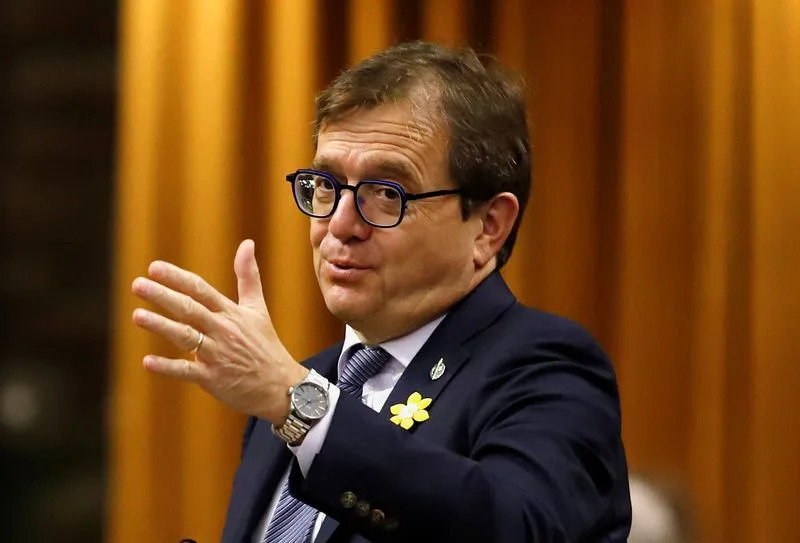


Visitors to the Ivanhoe Mines booth speak with a company representative during the PDAC convention in Toronto
By Divya Rajagopal
TORONTO (Reuters) -Canada will not force Chinese state-investors in three of its large mining companies to divest stakes, as such a move would create policy uncertainty, the natural resources minister told Reuters.
In November, Canada had asked three Chinese companies to sell their stakes in Toronto-listed lithium explorers following a national security review, drawing criticism from the mining industry and raising questions about the future of other Chinese investments in the Canadian mining sector.
"If you start looking backwards at investments, it will create all kinds of uncertainty about whether an investment is ever really an investment," Natural Resources Minister Jonathan Wilkinson said in an interview late on Tuesday on the sidelines of Prospectors and Developers Association of Canada (PDAC) conference in Toronto.
Three of Canada's largest mining companies - Teck Resources, Ivanhoe Mines Limited and First Quantum Minerals Limited, - count Chinese state-owned enterprises as their biggest single shareholder.
This is the first time Canadian government officials have clarified what the future holds for other Chinese investments in the three Canadian mining companies.
According to Refinitiv data, the sovereign wealth fund China Investment Corp owns a 10.3% stake in Teck, China's state-owned CITIC Metal Group owns 26% in Ivanhoe Mines while China's largest copper producer Jiangxi Copper Corp Ltd owns 18.3% in First Quantum Minerals.
Shares in First Quantum were up 3.6% on Wednesday, also helped by news that Panama's government and the miner had agreed on the final text for a contract to operate a key copper mine. Ivanhoe gained 2%, while Teck climbed 1.3%.
Canada's move late last year had worried smaller mining companies in the country who are looking to raise funds for exploration of critical metals.
Wilkinson added that Canada remains concerned over Chinese state-owned enterprises having "control" of Canadian mining companies through mechanisms such as long-term off take agreements, where buyers secure exclusive long-term supply of metals at certain price.
Canada and its allies are looking to decouple from China in an attempt to diversify their supply chain in battery metals.
In spring this year, Canada will introduce a revamped Investment Canada Act that will reject or impose conditions on foreign investments that the government considers a threat to its national security.
But Wilkinson clarified that Canada will continue to trade with China. "Of course Canada will continue to have trade with China, some of that may involve trade in critical minerals."
Ottawa's forced sale of Chinese investments in Canadian mining companies has further irked Beijing and added to the widening rift between the two countries. Diplomatic tensions between Canada and China have been running high since the detention of Huawei Technologies executive Meng Wanzhou in 2018 and Beijing's subsequent arrest of two Canadians on spying charges.
Last year, Canada released a new Indo-Pacific strategy to challenge China on human rights issues, and described China as an "increasingly disruptive, global power."
(Reporting by Divya RajagopalEditing by Denny Thomas, Nick Zieminski and Chizu Nomiyama)
BC
7 years into crisis, politicians still struggle to see drug users as people, Dr. Bonnie Henry says
Wed, March 8, 2023
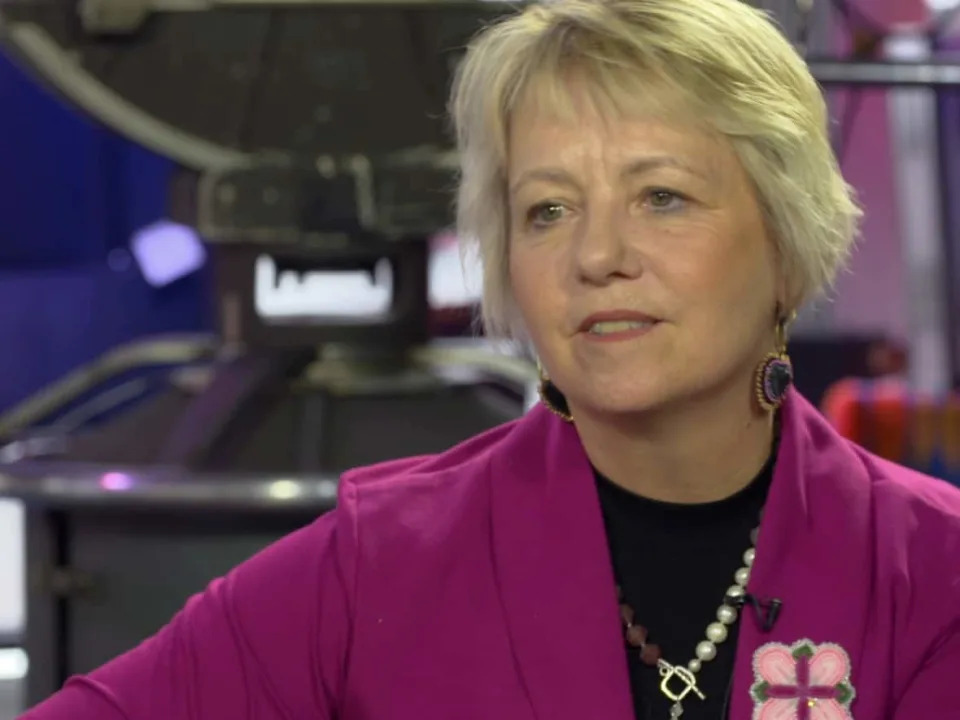
B.C. Provincial Health Officer Dr. Bonnie Henry spoke to CBC News in a wide-ranging interview marking three years of the COVID-19 pandemic. (CBC News - image credit)
As nearly seven people continue to die each day from B.C.'s poisoned drug supply, Provincial Health Officer Dr. Bonnie Henry says politicians are still grappling with the concept that drug users deserve to be treated like people.
In a wide-ranging interview with CBC News, Henry described the toxic drug crisis as "the most challenging issue that I've ever dealt with in public health."
One of the biggest issues when it comes to public policy, she said, is getting elected officials to shift their thinking after a century of prohibition and criminalization of drug users.
"It has been really difficult for politicians to wrap their heads around," Henry said. "These are people."
In the almost seven years since a public health emergency was declared in B.C. over illicit drug deaths, the provincial health officer says minds are beginning to change about how to approach the problem, but "slowly, too slowly."
"We're recognizing that people who use drugs are people first," she said. "They're our friends, our family, they're our colleagues, they're our neighbours."
Her words echo those of Chief Coroner Lisa Lapointe, who has said it's been a struggle to move public policy away from an ideology that suggests the only way to help drug users is to "harm them as much as we can."
Vince Tao, a community organizer for the Vancouver Area Network of Drugs Users (VANDU), said it's not just politicians who have trouble seeing drug users as human; it's also academics, researchers, police and the media.
"She's not wrong, but I would say, with all due respect, that's her job, right?" he said of Henry's comments. "Her job is to make sure that her colleagues, her cohort, understands the severity of the crisis at hand."
Tao believes real change requires more than just viewing drug users as human. He said it also requires allowing them and other marginalized people to have power and a voice in how decisions are made.
'Things got dramatically worse' during pandemic
Henry spoke with CBC News to mark three years of the COVID-19 pandemic, another public health emergency that has led to an ever-increasing number of deaths from toxic drugs.
On Tuesday, Lapointe's office released the latest numbers on the drug crisis, revealing that 211 people were killed by illicit drugs in January. The death rate that month was 47 people per 100,000, more than double what it was in April 2016, when the public health emergency was declared.
Henry said it was distressing to watch as more people began using alone because of public health restrictions related to the pandemic. Other measures also caused the illicit drug supply to become increasingly dangerous.
"Because of international trade being interrupted and people making large batches on their own at home, there's no quality assurance to any of it, so things got dramatically worse," Henry said.
That includes a major spike in the deaths among men aged 30 to 59, many of whom had jobs and were using at home, without the knowledge of their families.
Watch | Provincial health officer addresses toxic drug crisis
But Henry said the pandemic also created some opportunities. Public health officials had to work closely with elected officials on how to deal with COVID-19, which resulted in more trust and openness to new ideas.
As an example, she pointed to a three-year pilot project decriminalizing personal possession of very small amounts of some drugs in B.C.
When Henry released a report in 2019 calling for similar measures, "it was dismissed by government," she said.
"Having built that relationship of trust through the pandemic enabled us to have a conversation and to go back and say, look, read this again, let's think about this," she said.
That the province went on to apply for an exemption from federal drug laws, and that some version of decriminalization was approved is "a massive step forward" in Henry's mind.
"They call it a pilot program. I cannot see us going back from this," she said. "What we need to do is ensure that it is implemented, that we take the criminal justice system out of people's lives."
She said she's spoken to mothers who are afraid to ask for help with addiction because they're scared of being labelled as criminals and losing their children. Henry hopes decriminalization will take away some of those fears.
But B.C. still has a long way to go in terms of policies to stop the flood of drug deaths, she added.
That includes expanding access to prescribed safer supply, which is still reaching only a small percentage of drug users and is not available in many communities.
It also includes reforming the treatment and recovery system, which is not subject to provincial regulation ensuring facilities are using evidence-based methods and employing qualified staff.
"We have no system," Henry said. "There's never been a system to understand who's in there, how well they do, how often people relapse."
In the end, though, the drug crisis isn't just about drugs in Henry's mind. It's about overlapping, systemic issues including B.C.'s fragmented mental health-care system, homelessness and incomes that don't cover the cost of living in this province.
"It is more than just one thing," she said.





































